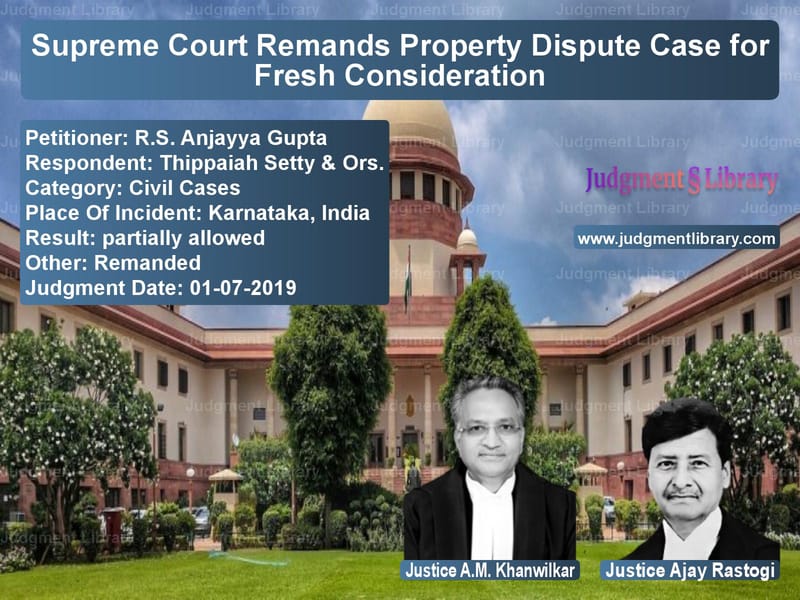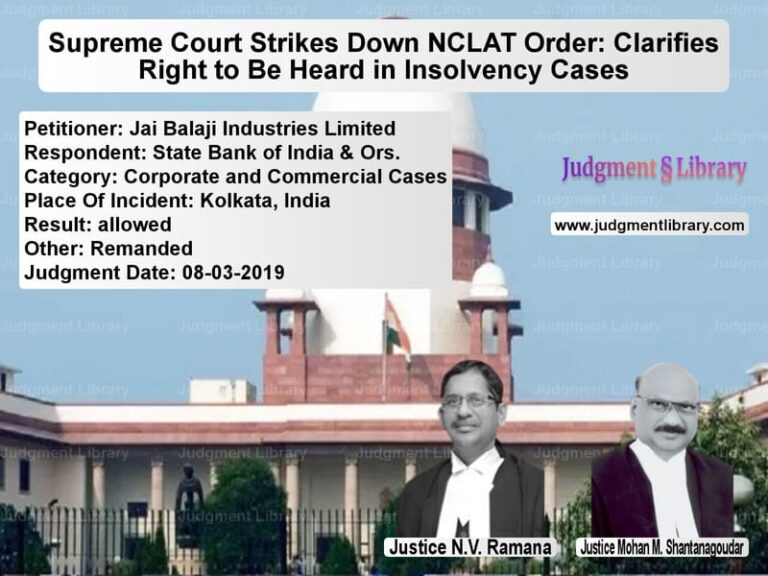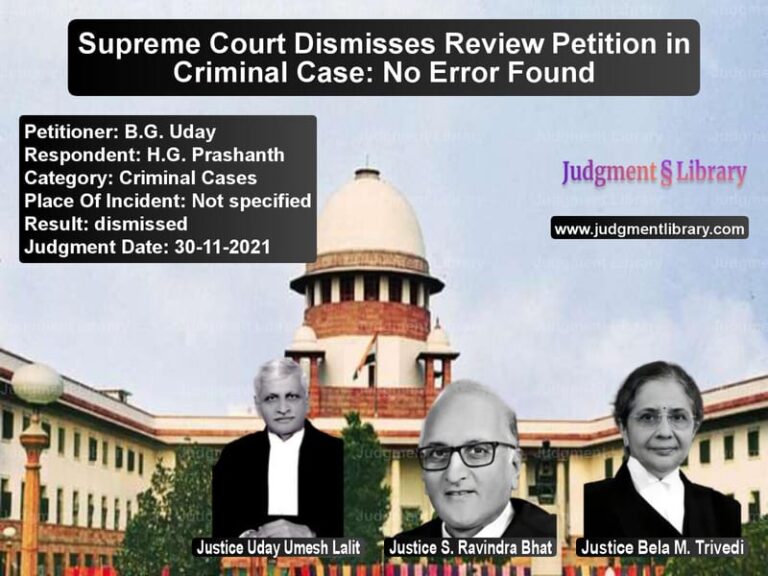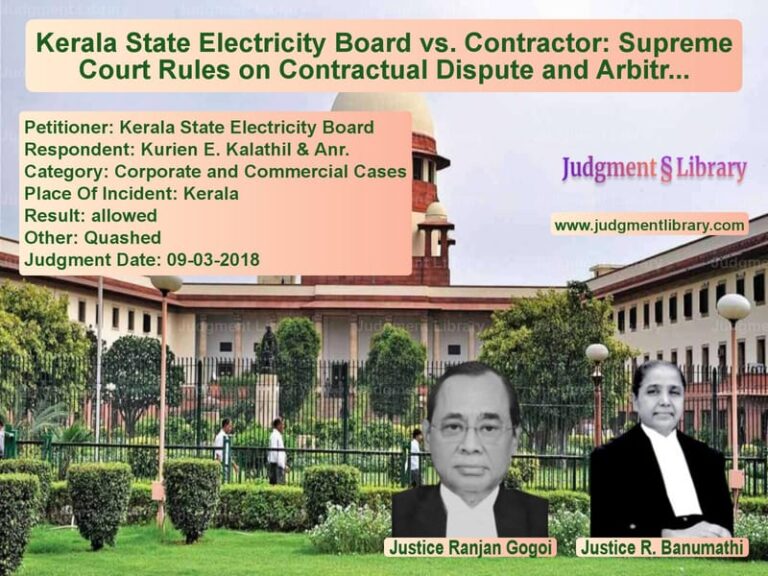Supreme Court Remands Property Dispute Case for Fresh Consideration
The case of R.S. Anjayya Gupta vs. Thippaiah Setty & Ors. is a landmark judgment concerning a dispute over the classification of certain properties as self-acquired or joint family properties. The Supreme Court overturned the Karnataka High Court’s ruling and remanded the case for fresh consideration, citing the High Court’s failure to properly analyze evidence and apply legal principles.
The dispute originated from a partition suit filed by one of the legal heirs of Hanumanthaiah Setty, claiming that properties acquired in the name of his eldest son, R.S. Anjayya Gupta, were purchased using joint family funds and should therefore be treated as joint family assets. The trial court ruled in favor of the plaintiffs, which was later upheld by the High Court. However, the Supreme Court found that the High Court’s decision lacked a thorough review of the evidence and procedural fairness.
Background of the Case
The legal dispute centers around the ownership of properties listed in Schedules A and B of the suit, which were purchased in the name of the appellant, R.S. Anjayya Gupta. The plaintiff contended that these properties were bought using funds from the joint family, which included the appellant and his siblings.
The key points in the case were:
- The suit for partition was filed in 1982, alleging that the properties were joint family assets.
- The appellant argued that he had purchased the properties using his personal funds and that they were self-acquired.
- The trial court ruled that the properties were joint family assets and ordered their partition.
- The High Court upheld the trial court’s ruling without independently analyzing the evidence.
Petitioner’s Arguments
The appellant, R.S. Anjayya Gupta, argued that:
- The High Court failed to conduct a proper review of the evidence before affirming the trial court’s decision.
- The plaintiff failed to prove that the properties were purchased using joint family funds.
- The burden of proof was incorrectly placed on him to show that the properties were self-acquired.
- The High Court did not properly evaluate his financial independence and his ability to acquire the properties using his own resources.
Respondent’s Arguments
The respondents, led by Thippaiah Setty, contended that:
- The properties were purchased during the continuation of the joint family status.
- The joint family had sufficient nucleus to fund the purchase of the properties.
- The appellant did not provide sufficient evidence to show that he acquired the properties without assistance from joint family funds.
- The trial court’s ruling was based on legal principles of Hindu joint family property, which presumes that properties acquired during the existence of a joint family are joint family assets unless proven otherwise.
Supreme Court’s Observations
The Supreme Court, in its judgment delivered by Justices A.M. Khanwilkar and Ajay Rastogi, ruled that the High Court failed to properly analyze the evidence and erred in affirming the trial court’s decision without an independent review.
Failure to Conduct Proper Review
“The High Court, in directing partition of the suit properties, failed to independently analyze the documentary and oral evidence produced by the parties.”
The Court emphasized that the High Court did not provide adequate reasoning for its decision and merely reiterated the trial court’s findings.
Burden of Proof Misplaced
“Once the acquisition of properties is alleged to be from joint family funds, the burden of proof shifts to the person claiming self-acquisition to prove independent source of funds.”
The Court clarified that while the presumption of joint family ownership exists, it does not relieve the plaintiff from proving that the joint family had sufficient financial resources at the time of purchase.
Case Remanded for Fresh Consideration
“The appeals are accordingly allowed. The impugned judgment and decree are set aside, and the matter is remanded to the High Court for fresh adjudication.”
The Supreme Court ordered the High Court to conduct a fresh review of the appeal, considering all relevant evidence before arriving at a final conclusion.
Final Ruling and Impact
The Supreme Court ruled:
- The High Court’s judgment was set aside.
- The case was remanded for fresh adjudication.
- The High Court was directed to provide a reasoned judgment based on a proper evaluation of evidence.
Legal Precedents Considered
The Supreme Court referred to key rulings on joint family property and burden of proof, including:
- Appasaheb Peerappa Chamdgade vs. Devendra Peerappa Chamdgade (2007) 1 SCC 521: Established that once a joint family nucleus is proved, the burden shifts to the claimant to establish self-acquisition.
- H.K.N. Swami vs. Irshad Basith (2005) 10 SCC 243: Emphasized that appellate courts must provide reasoned judgments.
- Santosh Hazari vs. Purushottam Tiwari (2001) 3 SCC 179: Clarified that first appellate courts have a duty to analyze evidence before affirming lower court rulings.
Implications of the Judgment
This ruling has significant implications for property disputes:
- High Courts must independently analyze evidence before affirming trial court decisions.
- Burden of proof in joint family property cases remains crucial and must be applied correctly.
- Cases should not be decided solely based on presumptions; substantial proof is necessary.
- Judicial reasoning must be clearly stated in appellate rulings.
Conclusion
The Supreme Court’s decision in R.S. Anjayya Gupta vs. Thippaiah Setty & Ors. reinforces the importance of procedural fairness in property disputes. By remanding the case for fresh consideration, the ruling ensures that judicial decisions are based on a thorough analysis of evidence, rather than mere presumptions. This case serves as an important precedent in clarifying the principles of joint family property and burden of proof in civil litigation.
Petitioner Name: R.S. Anjayya Gupta.Respondent Name: Thippaiah Setty & Ors..Judgment By: Justice A.M. Khanwilkar, Justice Ajay Rastogi.Place Of Incident: Karnataka, India.Judgment Date: 01-07-2019.
Don’t miss out on the full details! Download the complete judgment in PDF format below and gain valuable insights instantly!
Download Judgment: R.S. Anjayya Gupta vs Thippaiah Setty & Or Supreme Court of India Judgment Dated 01-07-2019.pdf
Direct Downlaod Judgment: Direct downlaod this Judgment
See all petitions in Property Disputes
See all petitions in Succession and Wills
See all petitions in Judgment by A M Khanwilkar
See all petitions in Judgment by Ajay Rastogi
See all petitions in partially allowed
See all petitions in Remanded
See all petitions in supreme court of India judgments July 2019
See all petitions in 2019 judgments
See all posts in Civil Cases Category
See all allowed petitions in Civil Cases Category
See all Dismissed petitions in Civil Cases Category
See all partially allowed petitions in Civil Cases Category







